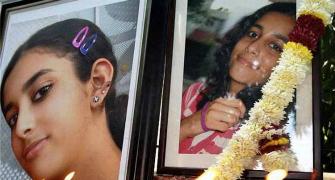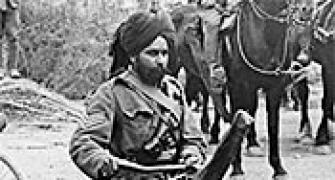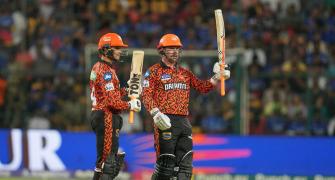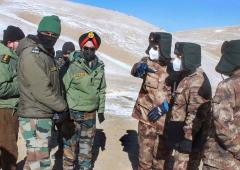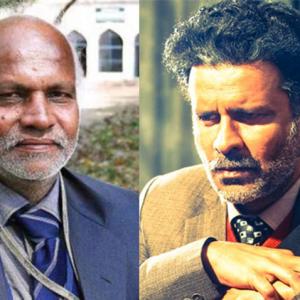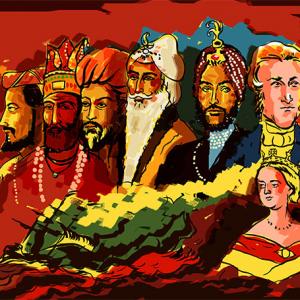'That winsome smile is a key asset. And says a lot about her too.'
Rediff.com's Vaihayasi Pande Daniel reports from the Sheena Bora murder trial.
Illustration: Dominic Xavier/Rediff.com
- Indrani, Peter, Sanjeev: A morning at the Sheena Bora trial
- And Peter Mukerjea went hungry...
- And Indrani Mukerjea sat there, alone...
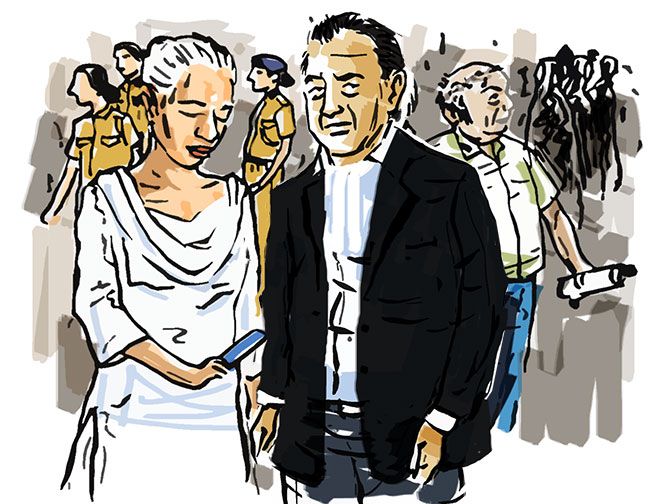
In the week after Holi you can feel the arrival of summer quite acutely at Mumbai's City Civil and Sessions Court, located near Kala Ghoda, south Mumbai, where the Sheena Bora murder trial has been unfolding since early February.
Unlike the much more stately, 1878, Gothic-design Bombay high court, a kilometre or so away, with its air-conditioned courtrooms, high ceilings, cool stone corridors and central shady courtyards with trees, the dowdy, cement block new wing of this court suffers a brutal Indian summer!
The lifts are still not working 45 days later. Or else they are available only to some...
Lawyers trussed up in stuffy black jackets and stiff white collars, undertrials, prisoners' relatives, chaiwallahs, court personnel, journalists, policemen tramp up and down the innumerable flights of steps, huffing and puffing in the sweltering 32 degrees Celsius heat.
The corridors, where so many accused sit with their kin, eating tiffins and waiting interminably, lack fans and the sun sharply beats in.
The ceilings in the courtrooms are low, the fans not that powerful; as a consequence the rooms are suffocating.
No surprise that Judge H S Mahajan, who is presiding over the Sheena Bora murder trial in Courtroom 51, has a special pedestal fan pointed at him. No small wonder either that the canteen boys are running up and down with stacks of mineral water bottles.
This annexe of the court, with its tacky bathroom tiles on the stairways, grubby walls that have not seen a paint job in a decade (it would appear), crumbling cement floors, piles of rubble and garbage, like the one outside the lift as you enter the building, is dismaying in appearance.
Peter Mukerjea, clutching a bottle of Bisleri and a file, and the perpetually stooped green-shirted Sanjeev Khanna, hanging onto his now familiar Grofers bag, arrived quite promptly on Thursday, March 16, just after 11.
The more agile Khanna reached the third floor first and was greeted by Peter's family. Peter's progress was a little slower as he approached the building, along with a multitude of other suspects.
You can quite easily close your eyes and imagine what the profile of the average defendant would be like around here.
Mainly young Muslim boys, many of them bearded, met by their large, not very well-to-do families, the women folk, the majority in burqas, hanging onto a herd of kids.
And a smattering of luckless, clueless, Africans, negotiating their way around a foreign court in broken English via policemen with equally broken English. No lawyers in sight, to dance around them, as they do outside Courtroom 51.
The battery of lawyers hanging out at Courtroom 51 didn't have much dancing to do on Thursday.
Hardly did Indrani Mukerjea arrive, later than usual -- clad in bright white, white bindi too, her hair also luminously white (she has a lot of white hair for someone who is 44 years old) -- and the trio of accused filed to the back of the room towards the aaropeechi jaga or the accused's enclosure and the hearing had concluded. The trio didn't get time to even sit down.
A little rewind here: At the last hearing, February 23, the defence took strong and vocal exception to CBI Prosecutor Bharat Badami's introduction of Khar police constable Ganesh Dalvi as a witness, who spoke about apprehending then accused Shyamvar Rai, the Mukerjeas' driver.
Rai is now the approver in the case and therefore his testimony is no longer considered admissible. Judge Mahajan agreed to get an opinion from the high court on this.
The opinion has still not come in because the CBI filed its objections in that court. The next hearing in this court is scheduled for March 31 and so ended the day's business.
It is uncertain if the high court's legal view will come by that date. The likelihood of the high court's advice coming in before Thursday was also unlikely, but the accused are routinely called to court in any case.
A helpful court reporter explained to me that since the accused are in the custody of the court, the judge needs to see them every 15 days for their safety and in case they have any issues to lay before him.
The Mukerjeas and Khanna were given half an hour to meet their relatives in the corridor outside and no time for lunch by the judge, although Peter took a little bag of something special to eat from his folks.
The family on Thursday consisted of his sister Shangon, who is a spitting image of Peter, his brother Gautam, a friend, his son Rabin (foreign, elegant girlfriend absent) and this time his strapping California-based nephew Shujah Das Gupta who favours pencil-thin square sideburns (Shagun's son).
The crowd of family that faithfully and sweetly surround their precious Peter -- incidentally born Pratim -- makes him fairly inaccessible. You have to peek past four policemen, three lawyers and six fierce-looking family members to see what he is up to.
Journalists are largely held at bay as the family is wary of, what they term, a trial by media like it allegedly happened to the Talwars (in the Aarushi murder case).
Sanjeev Khanna, sitting next to Indrani outside, collected some fresh clothes from his dour but loyal cousin (one tends to admire this young photographer relative, Nikhil Kapur, who has put his life on hold to be there for Sanjeev).
The Mukerjeas' and Khanna's day in court was following its usual rhythm with them about to wind up and head prison-wards, when who should walk in but one of Mumbai's top lawyers Mahesh Jethmalani.
Journalists quickly peppered him with: "Sir, have you come to see how things are going?"
Suddenly, the tempo changed in the oppressive hallway.
Suave Jethmalani has a booming voice and a presence. He immediately very respectfully sought the judge's permission to speak to his client for just 15 minutes.
"Next time it will be only 10 minutes," the lawyer assured the judge, thanking him repeatedly and graciously. Then he went out to speak to Indrani.
Peter was one bench away engrossed in deep conversation with the serious, sober, less flashy, equally respected lawyer, Shrikant Shivade (who defended actor Salman Khan).
Indrani in discussion with Jethmalani was the most animated I have seen her till date.
Her hands, holding a narrow metallic blue reading glasses case, flew about as she talked and rifled through papers with the legal eagle; her face full of life.
Her sprightly figure (in spite of mothering three children), white hair and contrasting youthful skin give her an odd young-old look. Like a very girlish woman wearing a wig of white hair.
She was surrounded by four young policewomen, one of them incongruously holding up a 1950s vintage musket, just in case Indrani decided to run off and needed to be apprehended.
When Jethamalani was done and got up to leave I didn't see him go over to the Mukerjea family or speak to Shivade, or maybe I missed it given the wall of Peter's relatives.
Instead, he went back into the courtroom to again profusely thank Judge Mahajan.
The judge was the liveliest I have seen him although he is not a grim man. Judge and lawyer began chatting. The judge shared details of his training and people he has encountered in his career.
While this was going on, Indrani stepped back into the courtroom to speak to the CBI contingent in Hindi.
When Mahajan noticed her, he interrupted his conversation with Jethmalani and asked why she was there, not unkindly.
She candidly explained (she has a very strong Assamese accent when she speaks Hindi; it is less pronounced while she speaks English) that she needed a copy of her late mother Durga Rani Bora's will.
Judge Mahajan mildly chided her, asking why would the CBI team have it.
The CBI did have it, Indrani told the judge in a firm voice, and she needed it.
Her mother, she added, had left everything to Sheena and Mekhail (Indrani's son with her first husband Siddhartha Das), but now with "Sheena..." -- she left the sentence hanging, open-ended -- it might go only to Mekhail.
Why she had to set that right was not clear. Evidently, there is Mekhail's petition lodged before the Guwahati high court that will be shortly up for a hearing, asking that Sheena's share of Durga Bora's Guwahati house should come only to Mekhail since Indrani had abandoned them.
The judge gave his assent to her obtaining an attested copy.
The lively Jethmalani-Mahajan banter -- some of it in Queen's English and some in chaste Hindi -- resumed and for some reason meandered to the tantrik Chandraswami who had once been Jethmalani's celebrated lawyer father Ram Jethmalani's acquaintance.
Judge Mahajan asked where Chandraswami was these days.
Mahesh Jethmalani, an engaging raconteur it would seem, went on to offer, in his thunderous and probably best courtroom voice, a tale about the godman, that he said needed a place in a book.
He had occasion to travel with Chandraswami to an African country "by the name of Zaire." He was careful to explain where Zaire was and how big it was -- "powerful desh" -- to the judge and anyone else who was listening.
Chandraswami was apparently in Zaire (once Congo) on the invitation of its notorious dictator Mobutu Sese Seko.
When Mahesh Jethmalani and Chandraswami presented themselves before the tinpot African ruler they were startled to discover that he sat flanked by "live tigers."
The upshot was that Chandraswami was there to perform a havan for Mobutu.
Jethmalani ended his story, saying: "That was his (Chandraswami's) prabhav (influence)!"
Then he bowed again reverentially and thanked Judge Mahajan two more times, exchanged a few words with the CBI's lawyer Badami and exited Courtroom 51.
So did Sanjeev, Peter and Indrani, in that order.
When it comes time to send the accused back to jail, the police posse always approach the much more amenable Sanjeev, to tell him his time is up, even though Peter and he travel to prison together.
Sanjeev, who comes across as gentle, departs invariably without a protest or squeak.
Then begins the policemen's task to pry the doughty Peter away from his clan.
Peter mostly ignores their requests till they are repeated multiple times, more and more insistently.
Peter is something of a phenomenon in this drab court building. He attracts attention, curiosity and some respect. People/lawyers stop to stare at him or say hello.
Indrani did a Peter on Thursday. She departed for jail, swishing along in white, trailed by Lady Cop 1, Lady Cop 2, Lady Cop 3, Lady Cop 4 and the long musket. They were soon out of sight.
Ten minutes later, she was back. She stood at the barricades near the prison bus -- her escorts looking possibly disconcerted and sweaty -- and with sign language endearingly, albeit slightly imperially, requested one of the journalists to call her lawyer because she had some papers to hand over.
Indrani may not have any friends or family soldiering along with her through this long trial. And even if she is down, she is certainly not out. In spite of being alone.
Her charm has not deserted her. That winsome smile is a key asset. And says a lot about her too.

